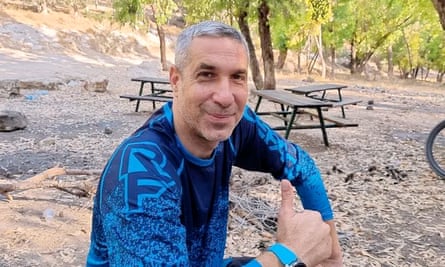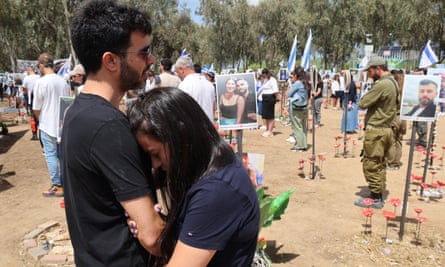The father of Shani Louk, a 22-year-old killed at the Nova music festival, says the family is relieved they will finally be able to bury their “beautiful girl” after her body was recovered from Gaza.
Images of militants parading Louk’s bloodied and broken body through Gaza on the back of a pickup truck were among the first to capture the horrors of the brutal 7 October attacks by Hamas.
The family initially hoped she had been injured and survived, but three weeks later learned that she was presumed dead, after fragments of her skull had been found at the festival site, Nissim Louk told the BBC’s Today programme.
“She brought light to the world, and beauty,” he said, in a tribute to his daughter. Her remains were brought back with those of Amit Buskila, 28, and Itzhak Gelerenter, 56, who were also murdered at the festival.

On Saturday, the Israel Defense Forces said it had recovered the body of another hostage, Ron Benjamin, 53, who had been taking part in a cycle ride near the border with Gaza when Hamas launched its murderous attack.
His body was found along with the other hostages recovered on Friday.
Despite domestic pressure over the fate of the remaining hostages still held in Gaza – more than a quarter of whom are thought to be dead – including weekly demonstrations in Tel Aviv, hopes of a deal to release them have ebbed.
Negotiations over a ceasefire and hostage releases have virtually stalled, with Hamas and the Israeli government blaming each other.
The unity that brought traumatised Israelis together in the immediate wake of the cross-border attack when Hamas and other Palestinian groups killed 1,200 people and took 254 hostage, has long since splintered.

Now with much of Gaza in ruins, the humanitarian crisis drawing criticism from even Israel’s close ally the US, and Hamas’s leaders on the ground neither killed nor captured, criticism of how the Israeli prime minister, Benjamin Netanyahu, is conducting the war is increasingly fierce and public.
As Israeli troops pushed into Rafah last week, and returned to parts of northern Gaza it claimed were cleared of Hamas months ago, a former Mossad deputy director turned opposition MP described the campaign in Gaza as a political, economic and military failure.
“This is a war without aim and we are unequivocally losing it,” said Ram Ben-Barak in a blunt interview with Israeli public radio.
“We are forced to go back and fight again in the same areas, losing soldiers, losing in the international arena, destroying relations with the US, the economy is collapsing,” he told the Reshet Bet radio station. “Show me one thing we are succeeding in.”
For months, Netanyahu has dodged questions about what will come after the war, saying Israel must focus on “destroying Hamas”. Critics say he has no incentive to end a war, when peace will bring an official reckoning with the political, military and intelligence failures.

Last week, as the US secretary of state, Antony Blinken, warned Israel that it risked “inheriting a Hamas insurgency”, the Israeli defence minister, Yoav Gallant, became the latest to go public with concerns about the lack of a long-term plan for Gaza.
In a televised address he called on Netanyahu to commit Israel not to seek to govern the Gaza Strip after the war. Immediately backed by fellow minister Benny Gantz he demanded that the prime minister describe his “day-after plan” for Gaza.
The premier’s war planning also came under recent attack by army chief Herzi Halevi as well as top Shin Bet security agency officials, according to Israeli media reports.
As Israeli forces pushed further into Rafah, which had been the main gateway for aid into all of Gaza, humanitarian organisations warned that not enough food was getting into an enclave which the US says faces an imminent famine.
Humanitarian assistance has begun to arrive via a US-made pier, but the US aid chief said the new sea corridor could not be a substitute for land crossings, and warned that deliveries of food and fuel had slowed to dangerously low levels.
More than 630,000 people who had fled Rafah since the offensive began on 6 May are in particular need of extra help, Sam Rose, director of planning at Unrwa, told Reuters. “They’re moving to areas where there is no water, we’ve got to truck it in, and people aren’t getting enough food,” he said.